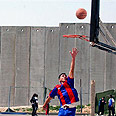
Playing in the wall’s shadow
צילום: איי פי
More wall, less fence
Some sections of West Bank security fence to be turned into a wall, after Palestinians damage barrier in Jerusalem area, senior IDF officer says
JERUSALEM - Security officials have decided to turn some sections of the West Bank security fence in northern Jerusalem into a wall because Palestinian residents repeatedly damaged the barrier, a senior IDF officer told Ynet Wednesday.
Authorities recently discovered several sections of the fence were damaged by Palestinians, including a 200-meter (about 650 feet) section in the Budrus area that was partially destroyed.
The officer said walls are expected to replace the fence mostly in populated areas.
“We realized that in urban areas, local residents tend to take apart and damage the fence during construction,” he said. “In those areas we have no choice but to build a wall.
The original plan called for less than 20 percent of the Jerusalem-area barrier to be made up of walls, but now it appears about one-third of the barrier will take the form of a wall.
The wall’s height ranges between 7 to 9 meters (approximately 22-30 feet.)
More delays expected
Meanwhile, Israel is expected to dismantle a one-kilometer section of the barrier east of the West Bank town of Qalqiliya before it is handed over to the Palestinian Authority.
The move aims to allow local residents easier access to other West Bank areas.
“We reached the conclusion that we should allow civilians more open, free movement,” the officer said. “We’ll use these materials (from the dismantled section) to built a section elsewhere.”
On another front, petitions to the High Court of Justice are delaying less than 3 percent of construction at various sites along the barrier’s route at this time, the officer said.
However, legal issues are expected to delay construction at large sections of the fence in the future, he said.











